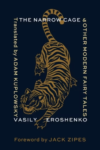This essay was originally published in the Full Stop Quarterly “Literary Dis(-)appearances in (Post)colonial Cities,” edited by Michelle Chan Schmidt. Subscribe at our Patreon page to get access to this and future issues, also available for purchase here.
Ukrainian poetics function as a mode of defense against disappearance and a mode of remembrance in the city. I will address the events that began with the 1990 Revolution on Granite, when Ukraine declared independence from the Soviet Union. I will continue to the 2014 Revolution of Dignity with protests against President Viktor Yanukovych, who was moving Ukraine away from the West and turning back to Russia. Finally, I will address the 2022 full-scale Russian invasion, an escalation of Russia’s war on Ukraine that began in 2014 with the invasion and annexation of Crimea. The city plays a role in the works of many Ukrainian writers. I will focus on the work of three poets—Yuliya Musakovska, Vasyl Makhno, and Lyuba Yakimchuk—as well as one fiction writer, Oksana Lutsyshyna. The content of their work shifts in an attempt to engage memory.
The Revolution on Granite and the Revolution of Dignity changed the city physically. Cobblestones were torn from the ground and hurled. The hundreds of people who congregated in Kyiv’s Independence Square lent it a bustling character: that sense of solidarity was important to the city. Yet the subsequent continuation of the war taking place in the Donbas region, culminating in the full-scale Russian invasion, killed the city’s civilians and destroyed its infrastructure. Along with solidarity, it created an atmosphere of fear through air raid sirens.
Svetlana Boym writes in The Future of Nostalgia, “The city then, is an ideal crossroads between longing and estrangement, memory and freedom, nostalgia and modernity.” It is especially important to note the struggle between memory and freedom. Sometimes, letting go of memory can make one freer; and at other times, when we begin to own the past and consciously break free from it, memory itself can become freedom.
In her 1989 collection November, the poet Natalka Bilotserkivets wrote the iconic line, “We will not die in Paris.” By contrasting Paris with a Ukrainian space, Bilotserkivets preserves the confines of the Ukrainian city for us and refuses any possible imagined community outside of Ukraine. As Caroline Herbert writes of the metaphorical city, “stories and experiences cross each other’s paths and ‘weave places together’ into an ‘urban text.’” Bilotserkivets weaves the story of Paris together with that of Ukrainian cities into an urban text of what it means to be Ukrainian.
One of the most well-known texts about the Ukrainian city is a novel by Valerian Pidmohylny aptly titled The City, published in 1928 (an English translation is forthcoming, by Maxim Tarnawsky). The main character Stepan goes to the city, Kyiv, from the countryside. When he first arrives in the city, Stepan notes:
“From Revolution Street down the wide stairs to the Dnipro rolled a colorful wave of boys, girls, women, men—a white and pink stream of moving bodies anticipating the sweet comfort of sunshine and water. There were no sad faces in this crowd. Here, at the edge of the city, began a new land, the land of primordial happiness.” But then his excitement withers: “The city, which had looked sun-bleached and airy from afar, now hung over them, dark and heavy.” And later, “Everything around him was strange and alien. He saw the shooting gallery, where air guns were being fired, stalls with ice cream, beer, and kvas, huckstresses with rolls and seeds, boys with irises, girls with baskets of apricots and morellos. Hundreds of faces floated past him, some happy, some serious, some troubled. . . This was how it usually was here, and how it was when his feet were still treading the soft dust of the village, and how it would continue to be. And to all of this he was a stranger.”
In Kyiv, he becomes interested in writing after he attends a literary performance, and the desire to create a story completely overtakes him. His moods become reflective of the city as a whole, and he experiences a period of anger when a famous critic refuses to read the work he is so proud of:
“‘Finding himself near a park, he went in and sat down on an isolated bench. After a while, he looked around and recognized his surroundings—it was Golden Gates Square, with a fence around the two piles of crumbling stone from which it took its name. Overcome by a rising flame of all-consuming hatred, he muttered gruffly and with a wry smile: “Golden Gates, indeed!’”
The crumbling stone, remnants of Kyiv’s 11th-century fortifications as the capital of Kyivan Rus’, mirror the “unexpected wound” of disappointment and hurt pride that “cloud all of the young man’s thoughts,” coming up against the city’s cosmopolitanism. By the end of the book, he is writing again, sifting through memories of the people he has encountered.
In her poetry collection The God of Freedom, published in English translation nearly a century after Pidmohylny’s City, in 2024, poet Yuliya Musakovska addresses the importance of physically remaining in the city that is subjected to war. The city is more than home, more than a physical, familiar space; its geography is also the vessel for memories of revolution, a desire for freedom, and the sadness of war. In the face of war, it is important to remain tethered to the city from which one has come. By remaining, and by poeticizing this act of resistance, Musakovska fights the disappearance of the city and emphasizes the appearance of memory. This appearance is a conscious breaking free from the fear imposed by war, moving towards the remembrance of urban solidarity and the creation of its new possibilities.
Independence Square, part of downtown Kyiv, is the location of Revolution, where people gathered for the Revolution on Granite and the Revolution of Dignity. In Musakovska’s poem, ‘Angel of Maidan,’ she writes: “Let someone’s damned tongue slip, / Saying ‘This is not your war’ . . .” While some may desire to flee the Ukrainian city, she doesn’t agree: this is everyone’s war. She also portrays the city’s subterranean side in the same poem: “it is hot and crowded in the subway . . .” In the full-scale Russian invasion, the subway becomes a place of shelter and escape: it forms a temporary home and a temporary community, separate from the known city above-ground. The subway is a place to be free from memory.
Musakovska plays with the figure of Archangel Michael in ‘Angel of Maidan,’ adding a mythological and spiritual aspect, imbuing the city with more than a physical presence. It is full of the idea of freedom. A child proclaims, “I am Ukraine,” revealing their symbolic status as a unifying mythology, more than simply human.
The poem ‘The Sorceress’s Oath’ also contains a mythological dimension: “Wringing your hands behind your back / Seeing the mortally wounded, / a shattered porcelain memory . . .” It collapses the distance between memory and reality, alluding to events that took place in Kyiv as mentioned above where many civilians were killed. In the end, it attempts to erase memory, “And only once in a while failing/by wiping away the painful memories/of a broken child”
But the connection between fear and solidarity is also negotiated through memories of the city. Where death creates fear, life creates solidarity. In her poem ‘The Vow,’ Musakovska writes about maintaining the human relationships within a changing city: “Do you take this man / to be quiet with him more often than talk, / this silence being more valuable than any conversation . . .” A time of silence between two people in the chaotic urban space fills up with memory and enables a conscious idea of freedom by allowing the dimension of the past to coexist in the same space.
Their relationship is happening parallel to the war that is taking place in the city since the Russian invasion. The relationship alludes to the relationship with one’s homeland. ‘A Home to Freedom’ is a similar poem about a relationship. Musakovska writes, “The man that became my home / wants to become my freedom,” linking home and freedom as in the Revolution on Granite and the Revolution of Dignity on Independence Square.
Like Natalka Bilotserkivets, poet Vasyl Makhno evokes foreign cities like Berlin and Paris in his poems, but contrary to her, he uses their poetic spaces to create an imagined community for himself. He is the epitome of Baudelaire’s flâneur, comfortable in cities abroad as he is at home. Deeply in tune with world literature, Makhno imbues his poetry with the collective memories of other poets such as C. P. Cavafy, Derek Walcott, and Philip Larkin.
Makhno’s poem, ‘February Elegy,’ is about the Revolution of Dignity of 2014. He begins, “Today the muse – is this nurse . . .” The nurse is an “angel of death” like Musakovska’s Archangel Michael, an individual who cares for those who have made the ultimate sacrifice for freedom. Makhno’s elegy reaches into Ukrainian collective memory with a mention of Taras Shevchenko. Born in 1814, Shevchenko’s collection Kobzar is said to be the foundation of modern Ukrainian literature. Ending on “the two-hundred-year-old Shevchenko,” Makhno’s ‘February Elegy’ emphasizes Shevchenko’s immortality and thus the endurance of the Ukrainian identity, grounded in its collective memory of literature, of culture, and of resistance and revolution. By addressing collective memory, he fights disappearance.
And in his ‘Conversation Over Skype,’ the speaker describes living “in America like in a hotel.” Makhno’s speaker experiences the making of Ukrainian history from a distance, living twenty blocks from the ocean that separates him from his interlocutor over Skype. In the poem, he also metatextually speaks of finishing a part of his book: “I said that I have trimmed the bushes—and cut the grass / that now I’m a gardener and that’s how I live / and that the Parisian section will complete my book.” Makhno lives in New York City and writes about Paris, incorporating his imagined community again, but he remains connected to Ukraine, especially by writing poetry in Ukrainian. By choosing to write in Ukrainian as opposed to English, Makhno enlivens his memories of the city through the mode of language, resisting the city’s physical and linguistic disappearance though he is physically far away.
The poet Lyuba Yakimchuk, who is from the Donbas region, specifically Pervomaisk, has been affected by the war since it began in 2014. She alters her poems and their language to reflect the city’s happenings, particularly that of Pervomaisk, filled with industry. One of the poems that alters language is called ‘Decomposition,’ its words falling into memory, segments, and artifacts. Yakimchuk writes that ‘there’s no poetry about war / just decomposition / only letters remain / and they all make a single sound – rrr.’ That ‘rrr’ is the sound of disappearance, a signal of violence and transformed meanings where fear contaminates urban life.
While Musakovska insists on remaining in the city, sometimes the danger makes it impossible to stay. It becomes necessary to find a new city. In the introduction to her English-language poetry collection Apricots from Donbas, Yakimchuk writes: “The war started in my yard, in the house I grew up in . . . I’m trying to persuade my parents to leave. They refuse.” Eventually, they acquiesce and the meaning of home changes, though still within Ukraine; it becomes a memory.
Finally, Oksana Lutsyshyna’s novel Ivan and Phoebe, published in an English translation in 2023, focuses on the 1990 Revolution on Granite through the eyes of the protagonist, Ivan. Though Phoebe is a minor character, she still looms large in Ivan’s life. She represents what his life has become after the Revolution: something small and hopeless.
Lutsyshyna depicts the city changed by the Revolution: “After that extraordinary summer of 1991, when the old regime finally fell, and hundreds and thousands of people stood in the squares, chanting, breathing with a single pair of lungs, ‘End to K-P-U!’” Ivan remembers these incidents in his bones. He takes part in the Revolution by participating in a hunger strike and finds himself haunted by one of the people he is protesting against. The man seems to be everywhere he turns, threatening his mother and revealing disturbing secrets to Ivan. Against a backdrop of such fear and paranoia, Ivan escapes the city.
Ivan’s girlfriend at the time of the Revolution, Rose, doesn’t want to get married immediately after college, but hopes to work at the radio station. If Ivan goes to the countryside permanently, he will lose her: as a symbolic figure, Rose fills Ivan’s image of Kyiv with hope, whereas life in the countryside remains static and unchanging. Later, Ivan is sad to find that Rose married his old friend and now lives in the countryside, giving up the independence and hopes that made her special.
Lutsyshyna’s nod to Paris while Ivan is in Lviv echoes the above-mentioned authors and their imaginations of foreign cities and displaced communities. “No other city in Ukraine could boast a waterfront that felt so European—so Parisian!” By exposing Ivan’s comparison of Lviv to Paris, Lutsyshyna re-figures Lviv as a Western European metropolis in Ivan’s eyes, innately decomposing the trap that Lviv represents for Ivan and rebuilding it as somewhere grander, somewhere else. Lviv is, in Boym’s words, “an ideal crossroads between [Ivan’s] longing and estrangement, memory and freedom.” For Ivan, memory is a mode of connection with the Ukrainian nation and spirit: “Until that moment, he didn’t realize that to keep Ukraine inside him—all of it, the nation—was an effort of will and constant work.” In Lviv, he stood up for Ukraine and began to own its past, through this constant effort of will; and by owning his past, his memories enacted his freedom.
Most of the works discussed in this essay are present not only in their original form but have also been translated into English. According to Pierre Nora, “translation creates sites of remembrance, new poems which hold the memories of these events, poems as artifacts.” Translation creates another layer of memory. In her article ‘Pam’iat mista cia,’ ‘The memory of this city,’ Iryna Starovoyt highlights the city as an archive and as a museum. She also considers the city’s interrelations: for Starovoyt, the metaphorical city doesn’t exist on its own, but calls out to another city. Just as the above poets and novelist allude above all to Paris, but also to Berlin, the act of translating Kyiv, Lviv, Pervomaisk, and other Ukrainian cities into English transforms them into archives of Ukrainian revolution and collective memory.
Yuliya Musakovska, Vasyl Makhno, Lyuba Yakimchuk, and Oksana Lutsyshyna’s literary works all engage memory in their depictions of the city. Just as the physical space holds the tangible remnants of the Revolution on Granite, the Revolution of Dignity, and the full-scale Russian invasion, literature contains the spiritual and mythological remains of these urban inscriptions. From Pidmohylny’s novel to the present day, the Ukrainian city reflects the spectrum of human emotion, beginning with the anger that Stepan feels and ending with the nostalgic tenderness of memory. It bears witness as a space of resistance, destruction, but also unity and reconstruction.
Olena Jennings is the author of the poetry collection The Age of Secrets (Lost Horse Press, 2022) and the novel Temporary Shelter (Cervena Barva Press, 2021). She is a translator of collections by Ukrainian poets, Kateryna Kalytko, together with Oksana Lutsyshyna, Iryna Shuvalova, together with the author, and Vasyl Makhno. Her translation, together with the author, of Yuliya Musakovska’s The God of Freedom was released in May 2024 from Arrowsmith Press. She founded and curates the Poets of Queens reading series and press.
This post may contain affiliate links.






